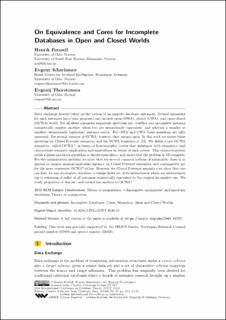| dc.contributor.author | Forssell, Henrik | |
| dc.contributor.author | Kharlamov, Evgeny | |
| dc.contributor.author | Thorstensen, Evgenij | |
| dc.date.accessioned | 2021-02-23T12:58:08Z | |
| dc.date.available | 2021-02-23T12:58:08Z | |
| dc.date.created | 2020-08-07T11:35:05Z | |
| dc.date.issued | 2020 | |
| dc.identifier.citation | Forssell, H., Kharlamov, E. & Thorstensen, E. (2020). On Equivalence and Cores for Incomplete Databases in Open and Closed Worlds. I C. Lutz & J. C. Jung (Red.), 23rd International Conference on Database Theory (ICDT 2020) (Bd. 155). | en_US |
| dc.identifier.isbn | 978-3-95977-139-9 | |
| dc.identifier.issn | 1868-8969 | |
| dc.identifier.uri | https://hdl.handle.net/11250/2729835 | |
| dc.description.abstract | Data exchange heavily relies on the notion of incomplete database instances. Several semantics for such instances have been proposed and include open (OWA), closed (CWA), and open-closed (OCWA) world. For all these semantics important questions are: whether one incomplete instance semantically implies another; when two are semantically equivalent; and whether a smaller or smallest semantically equivalent instance exists. For OWA and CWA these questions are fully answered. For several variants of OCWA, however, they remain open. In this work we adress these questions for Closed Powerset semantics and the OCWA semantics of [24]. We define a new OCWA semantics, called OCWA*, in terms of homomorphic covers that subsumes both semantics, and characterize semantic implication and equivalence in terms of such covers. This characterization yields a guess-and-check algorithm to decide equivalence, and shows that the problem is NP-complete. For the minimization problem we show that for several common notions of minimality there is in general no unique minimal equivalent instance for Closed Powerset semantics, and consequently not for the more expressive OCWA* either. However, for Closed Powerset semantics we show that one can find, for any incomplete database, a unique finite set of its subinstances which are subinstances (up to renaming of nulls) of all instances semantically equivalent to the original incomplete one. We study properties of this set, and extend the analysis to OCWA*. | en_US |
| dc.language.iso | eng | en_US |
| dc.rights | Navngivelse 4.0 Internasjonal | * |
| dc.rights.uri | http://creativecommons.org/licenses/by/4.0/deed.no | * |
| dc.title | On equivalence and cores for incomplete databases in open and closed worlds | en_US |
| dc.type | Chapter | en_US |
| dc.description.version | publishedVersion | en_US |
| dc.rights.holder | © Henrik Forssell, Evgeny Kharlamov, and Evgenij Thorstensen. | en_US |
| dc.source.pagenumber | 10:1-10:21 | en_US |
| dc.source.volume | 155 | en_US |
| dc.source.journal | Leibniz International Proceedings in Informatics | en_US |
| dc.identifier.doi | 10.4230/LIPIcs.ICDT.2020.10 | |
| dc.identifier.cristin | 1822166 | |
| dc.relation.project | Norges forskningsråd: 237898 | en_US |
| dc.relation.project | Norges forskningsråd: 230525 | en_US |
| dc.source.articlenumber | 10 | en_US |
| cristin.ispublished | true | |
| cristin.fulltext | original | |
| cristin.qualitycode | 1 | |

